
Western Sahara is a disputed territory in North-western Africa. It has a surface area of 272,000 square kilometres (105,000 sq mi). Approximately 30% of the territory is controlled by the Sahrawi Arab Democratic Republic (SADR); the remaining 70% is occupied and administered by neighboring Morocco. It is the most sparsely populated territory in Africa and the second most sparsely populated territory in the world, mainly consisting of desert flatlands. The population is estimated at 618,600. Nearly 40% of that population lives in Morocco-controlled Laayoune, the largest city of Western Sahara.
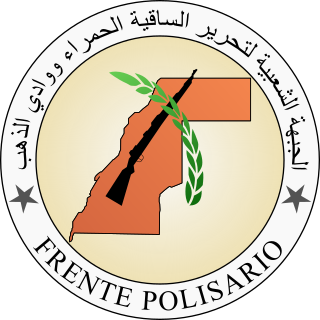
The Polisario Front, Frente Polisario, Frelisario or simply Polisario, is a Sahrawi nationalist liberation movement seeking to establish a Sahrawi Arab Democratic Republic for the Sahrawi people through the means of self-determination and armed resistance in the disputed territory of Western Sahara.

Elections in the Sahrawi Arab Democratic Republic are regularly held by the government-in-exile at a national, regional and local level. Elections are considered to be held under a non-partisan participatory democratic regime, as the Sahrawi Arab Democratic Republic (SADR) and the Polisario Front structures are parallel.

Mohamed Abdelaziz was the 3rd Secretary General of the Polisario Front, from 1976, and the 1st President of the Sahrawi Arab Democratic Republic from 1982, until his death in 2016.
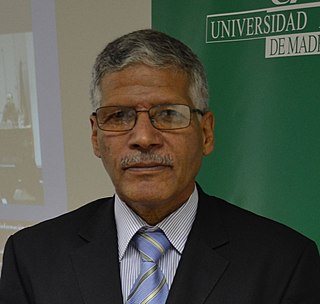
Abdelkader Taleb Omar is a Sahrawi politician who serves as the ambassador of Sahrawi Arab Democratic Republic to Algeria since 17 March 2018. He is a former prime minister.

Sahrawi Youth Union, also known by its Spanish acronym UJSARIO, is the youth organization of the Polisario Front.

Tifariti is an oasis town and the temporary capital of the Sahrawi Arab Democratic Republic, located in north-eastern Western Sahara, east of the Moroccan Berm, 138 km (86 mi) from Smara and 15 km (9 mi) north of the border with Mauritania. It is part of what Polisario Front calls the Liberated Territories and Morocco call the Buffer Zone. It has been the de facto temporary capital of the Sahrawi Arab Democratic Republic since the government moved there in 2008 from Bir Lehlou. It is the headquarters of the 2nd military region of the SADR.

Mahfoud Ali Beiba Hammad Dueihi was a Sahrawi politician and co-founder of the Polisario Front, a national liberation movement that seeks self-determination for Western Sahara. From 1975 until his death, he lived in an exile in the refugee camps of Tindouf, Algeria.

The Free Zone or Liberated Territories is a term used by the Polisario Front government of the Sahrawi Arab Democratic Republic, a partially recognized sovereign state in the western Maghreb, to describe the part of Western Sahara that lies to the east of a 2,200-kilometre (1,400 mi) border wall flanked by a minefield, often referred as the Berm, and to the west and north of the borders with Algeria and Mauritania, respectively. It is controlled by the Sahrawi Arab Democratic Republic, as opposed to the area to the west of the Berm, which is controlled by Morocco as part of its Southern Provinces. Both states claim the entirety of Western Sahara as their territory.

The Sahrawi National Council or Sahrawi Parliament is the legislature of the Sahrawi Arab Democratic Republic. Its structure and competences are guided by the Constitution of the Sahrawi Arab Democratic Republic (SADR). The present speaker since 2020 is Hamma Salama.
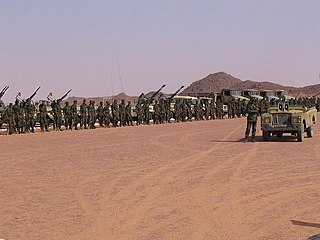
The Western Sahara conflict is an ongoing conflict between the Sahrawi Arab Democratic Republic/Polisario Front and the Kingdom of Morocco. The conflict originated from an insurgency by the Polisario Front against Spanish colonial forces from 1973 to 1975 and the subsequent Western Sahara War against Morocco between 1975 and 1991. Today the conflict is dominated by unarmed civil campaigns of the Polisario Front and their self-proclaimed SADR state to gain fully recognized independence for Western Sahara.
Since the end of the 1980s, several members of POLISARIO have decided to discontinue their military or political activities for the Polisario Front. Most of them returned from the Sahrawi refugee camps in Algeria to Morocco, among them a few founder members and senior officials. Some of them are now actively promoting Moroccan sovereignty over Western Sahara, which Morocco considers its Southern Provinces. Their individual reasons to stop working for POLISARIO, as reported in the media, vary, but include allegations of human rights violations, monopolization and abuse of power, blackmailing and sequestering the refugee population in Tindouf, and squandering foreign aid. They also claim POLISARIO is controlled by the government of Algeria and as one former member of POLISARIO put it, "[was] a group of Moroccan students who were urging the Spanish colonizer to leave and who had never claimed independence or the separation from motherland Morocco."
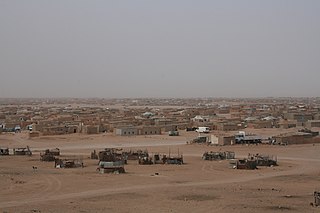
The Sahrawi refugee camps, also known as the Tindouf camps, are a collection of refugee camps set up in the Tindouf Province, Algeria, in 1975–76 for Sahrawi refugees fleeing from Moroccan forces, who advanced through Western Sahara during the Western Sahara War. With most of the original refugees still living in the camps, the situation is among the most protracted in the world.

Elections to the Sahrawi National Council were held between 17 and 19 February 2008. More than 126 candidates competed for the 53 seats in the Council, the unicameral legislature of the partially recognized Sahrawi Arab Democratic Republic. The Council was elected for a period of three years. The elections were only held in the Free Zone of Western Sahara and in Sahrawi refugee camps in Algeria, the rest of Western Sahara being under the de facto administration of Morocco. As stipulated in the Sahrawi constitution, the renewal of the Council occurred after the previous Council was dissolved following the 12th Congress of the Polisario Front, which took place two months earlier between 14 and 21 December 2007. First-time MPs represented 61.53% of those elected. The percentage of young people in the new Council stood at 57.67%, while women gained 34.61% of seats, thanks in part to a quota system. Mahfoud Ali Beiba was reelected Speaker of the Council on 27 February 2008.

Brahim Ghali is a Sahrawi politician, military officer and current president of the Sahrawi Arab Democratic Republic (SADR), formerly its ambassador to Algeria and Spain.
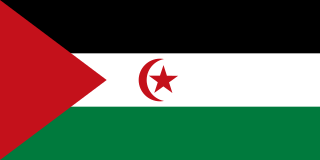
The Sahrawi Arab Democratic Republic, also known as the Sahrawi Republic and Western Sahara, is a partially recognized state, located in the western Maghreb, which claims the non-self-governing territory of Western Sahara, but controls only the easternmost one-fifth of that territory. It is recognized by 44 UN member states and South Ossetia. Between 1884 and 1975, Western Sahara was known as Spanish Sahara, a Spanish colony. The SADR is one of the two African states in which Spanish is a significant language, the other being Equatorial Guinea.

Women in the Sahrawi Arab Democratic Republic are women who were born in, who live in, or are from the Sahrawi Arab Democratic Republic in the region of the Western Sahara or the Sahrawi refugee camps. In Sahrawi society, the women share responsibilities at every level of its community and social organization. Article 41 of the Constitution of the Sahrawi Arab Democratic Republic ensures that the state will pursue "the promotion of women and [their] political, social and cultural participation, in the construction of society and the country's development".

Khatri Addouh is a Sahrawi politician, currently holds the position of the Minister of Education and Vocational Training in the Sahrawi Arab Democratic Republic. Previously, he served as the president of the Sahrawi National Council from 2010 to 2020. Following the passing of the long-time president, Mohamed Abdelaziz, on 31 May 2016, Addouh was appointed as the acting president and the Secretary General of the Polisario Front.
Hamma Salama is a Sahrawi politician and former military officer serving as the speaker of the National Council since March 2020. He is a member of the Polisario Front and previously was a member of the national secretariat.














